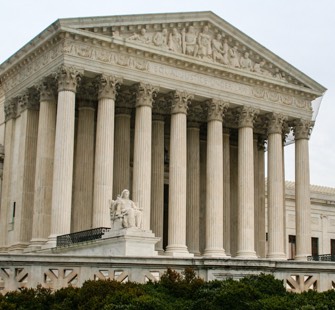Eli Lilly cancer treatment upheld by PTAB
 Several weeks ago, a final written decision issued by the Patent Trial and Appeal Board (PTAB) upheld a series of 22 claims from a patent owned by Indianapolis-based drugmaker Eli Lilly & Company. This decision ends an inter partes review (IPR), which was initially petitioned by Chicago-based generic pharmaceutical firm Neptune Generics to challenge a patent covering Alimta, a drug approved by the U.S. Food and Drug Administration (FDA) as a treatment for patients with advanced nonsquamous non-small cell lung cancer (NSCLC).
Several weeks ago, a final written decision issued by the Patent Trial and Appeal Board (PTAB) upheld a series of 22 claims from a patent owned by Indianapolis-based drugmaker Eli Lilly & Company. This decision ends an inter partes review (IPR), which was initially petitioned by Chicago-based generic pharmaceutical firm Neptune Generics to challenge a patent covering Alimta, a drug approved by the U.S. Food and Drug Administration (FDA) as a treatment for patients with advanced nonsquamous non-small cell lung cancer (NSCLC).
The Eli Lilly patent challenged by Neptune in the IPR was U.S. Patent No. 7772209, titled Antifolate Combination Therapies. Issued in August 2010, it covers a method for administering pemetrexed disodium to a patient in need thereof by administering effective amounts of folic acid and a methylmalonic acid lowering agent followed by administering an effective amount of pemetrexed disodium; the particular methylmalonic acid lowering agent used by the treatment is vitamin B12. The use of vitamin B12 in the treatment helps to reduce the cytotoxic activity which antifolates can create in a patient’s body when that patient is undergoing chemotherapy, helping to limit the potentially life-threatening toxicity which antifolates can cause in the human body.
Eli Lilly, Pfizer among those supporting Sequenom cert petition
 Recently, a group of amici led by Eli Lilly filed an amici curiae brief with the United States Supreme Court in the matter of Sequenom, Inc. v. Ariosa Diagnostics, Inc. The Eli Lilly brief was filed in support of the petitioner, Sequenom. Eli Lilly is joined in this brief by Eisai Inc., Upsher-Smith Laboratories, Inc., Pfizer Inc., and Etiometry, Inc.
Recently, a group of amici led by Eli Lilly filed an amici curiae brief with the United States Supreme Court in the matter of Sequenom, Inc. v. Ariosa Diagnostics, Inc. The Eli Lilly brief was filed in support of the petitioner, Sequenom. Eli Lilly is joined in this brief by Eisai Inc., Upsher-Smith Laboratories, Inc., Pfizer Inc., and Etiometry, Inc.
On March, 21, 2016, Sequenom filed a Petition for Writ of Certiorari in the Supreme Court, challenging the decision of the United States Court of Appeals for the Federal Circuit in Ariosa Diagnostics, Inc. v. Sequenom, Inc. If the Supreme Court takes this case, they will be asked to reconsider the unfortunate breadth of their prior ruling in Mayo Collaborative Servs. v. Prometheus Labs. See SCOTUS Blog Founder asks Supreme Court to Reconsider Mayo.
04.19.16 | Biotech, patent eligibility, Patent Issues, Pharma, posts, Supreme Court Cases | Gene Quinn
Hatch-Waxman: Eli Lilly Sues Actavis after ANDA Filed on Axiron®
Actavis PLC (NYSE: ACT) recently filed an Abbreviated New Drug Application (ANDA) with the U.S. Food and Drug Administration (FDA) seeking approval to market Testosterone Topical Solution, 30mg/1.5mL. Actavis’ ANDA product is a generic version of Eli Lilly and Company’s Axiron®, which is an androgen indicated for replacement therapy in males for conditions associated with a deficiency or absence of endogenous testosterone.
Eli Lilly and Company and Acrux DDS Pty Ltd. filed suit against Actavis on November 12, 2013, in the U.S. District Court for the Southern District of Indiana seeking to prevent Actavis from commercializing its ANDA product prior to the expiration of certain of its U.S. patents. The lawsuit was filed under the provisions of the Hatch-Waxman Act, resulting in a stay of final FDA approval of Actavis’ ANDA for up to 30 months from the date the plaintiffs received notice of Actavis’ ANDA filing or until final resolution of the matter before the court, whichever occurs sooner, subject to any other exclusivities.
11.18.13 | patent infringement, Patent Issues, posts | Gene Quinn
CAFC Upholds Validity of Lilly’s Alimta Compound Patent
 Earlier today, the United States Court of Appeals for the Federal Circuit affirmed an earlier District Court decision regarding the validity of Eli Lilly’s compound patent for Alimta® (pemetrexed). The compound patent provides protection for Alimta in the U.S. through January of 2017 and, as the result of this Federal Circuit decision, the relevant claims have had their validity confirmed. See Eli Lilly Co. v. Teva Parenteral Medicines, Inc. et al (August 24, 2012).
Earlier today, the United States Court of Appeals for the Federal Circuit affirmed an earlier District Court decision regarding the validity of Eli Lilly’s compound patent for Alimta® (pemetrexed). The compound patent provides protection for Alimta in the U.S. through January of 2017 and, as the result of this Federal Circuit decision, the relevant claims have had their validity confirmed. See Eli Lilly Co. v. Teva Parenteral Medicines, Inc. et al (August 24, 2012).
“We are pleased with today’s ruling from the Court of Appeals affirming the validity of the compound patent for Alimta,” said Robert A. Armitage, senior vice president and general counsel for Lilly. “By affirming the district court ruling, we believe that the Court fairly applied long-standing patent law principles. Protection of intellectual property rights is extremely important to the biopharmaceutical industry and the physicians and patients we serve, as these rights help support the development of the next generation of innovative medicines to treat unmet medical needs.”
08.27.12 | posts | Gene Quinn


No Comments
11.22.17 | Biotech, biotechnology patents, Patent Issues, Pharma | Gene Quinn